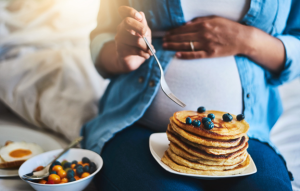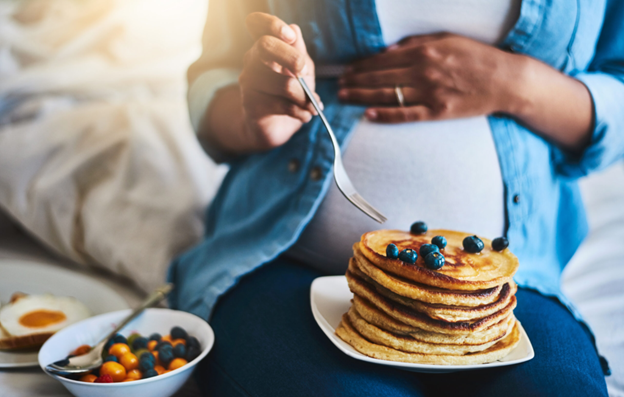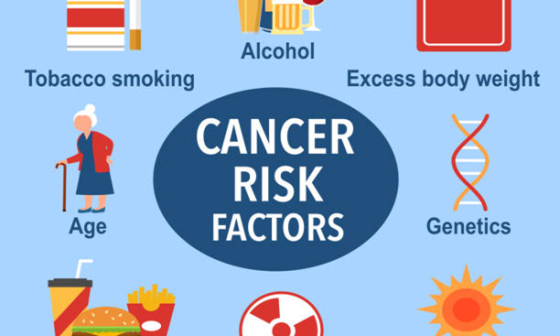Introduction
Do you have a baby on the way? Congratulations!
It is important to get the right nutrients your body needs each day to maintain the best possible health throughout your pregnancy. Both the growing baby and the mother experience major changes during pregnancy. While many foods offer vital nutrients to sustain both, proper nutrition is important, and there are hazards associated with some meals.

Credit: iStock/Gettyimages
Knowing what foods to avoid during pregnancy will help safeguard the developing baby and guarantee a smoother trip toward birthing. Safeguarding your health and that of your baby remains a need we will meet.
This article will list foods and ingredients that expectant mothers should avoid to protect their unborn child’s health.
Foods And Drinks A Pregnant Woman Should Avoid
- Raw or Undercooked Proteins
Even though it can be tempting to overindulge in some seemingly safe meals, raw or undercooked meats, such as chicken that has been partially cooked or suya, raw shellfish (sushi) can harbour dangerous parasites and bacteria like Toxoplasma, Listeria, or Salmonella. Salmonella can also be present in raw or undercooked eggs used in mayonnaise. According to the National Library of Medicine, these microorganisms can cause infections that harm the unborn child causing seizures, eye problems, learning difficulties, or result in life-threatening health issues.
- Unprocessed Dairy Products
During pregnancy, dairy products are necessary for supplying calcium and other nutrients; nevertheless, unpasteurized milk, cheese, and yoghurt may contain dangerous germs like Listeria. This can develop into listeriosis, with symptoms appearing two months after contaminated food consumption. Listeriosis raises the chance of miscarriage, stillbirth, or serious illness in neonates.
- Packaged and Processed Foods
Preservatives, sugar, salt, and harmful fats are present in high concentrations in most packaged and processed meals. Examples include sugary cereals, highly processed snacks, and instant noodles. Heavy consumption of these may predispose a pregnant woman to hypertension, gestational diabetes, or excessive weight gain during pregnancy.
- Excessive Caffeine Consumption
Caffeine use in moderation is thought to be harmless, but too much (>200 milligrams/ day) of it can raise the chance of miscarriage, low birth weight, or preterm delivery according to research done by the American College of Obstetricians and Gynaecologists. Furthermore, research shows that caffeine causes a reduction in blood flow to the fetus through constriction of blood vessels. It is not only caffeine present in coffee that has been implicated but caffeine present in tea, soft drinks, energy drinks, and chocolate must also be avoided.
- Alcohol Consumption
Pregnancy and alcohol use are known to produce fetal alcohol syndrome (FAS), which can result in birth abnormalities, developmental delays, and other health problems. There is no acceptable amount of alcohol to drink when expecting, alcohol should be avoided at all costs and alternatives sought.
- Excess Liver and Products Consumption
Animal protein like the liver is high in iron and vitamin A, but too much of either vitamin during pregnancy might be detrimental to the growing fetus. Reports show that a higher daily intake of preformed vitamin A greater than 10,000 IU could put an unborn child at risk for teratogenicity (that includes spina bifida (abnormal development of the spine), small or no eyes, cleft palate, absent or deformed ears, and deformities of limbs, kidneys, genitals, heart, thyroid gland, and skeleton).
- Raw, Unwashed Fruits and Vegetables
Although fruits and vegetables are necessary during pregnancy, improper washing might expose them to hazardous germs or parasites like Toxoplasma. Infections could result from this and harm the unborn child.
What Are The Alternatives?
Of course, there are certain things you shouldn’t eat if you are pregnant and expecting a baby, you may be asking so what are the alternatives?
The alternatives to foods that you should steer clear of while pregnant/ the foods that are safe for include:
- Properly cook and clean every piece of meat, poultry, fish, and egg. If you love eating suya, make sure to verify that it is prepared properly and eaten fresh.
- Consume only pasteurized and processed dairy and milk products. Select dairy and pasteurized milk products. Make sure your cheese (particularly soft cheeses like goat cheese) is manufactured from pasteurized milk by reading the labels on your food.
- Choose whole, fresh foods including grains, fruits, and veggies. If you need a snack, think about almonds, or prepared foods that are low in sugar or salt.
- Select cooked seafood and shellfish. If you are a sushi lover, go for completely cooked varieties, such as those that have cooked crab or prawns.
- Limit caffeine consumption to 200 milligrams per day or less, which is around one cup of coffee. Water, decaffeinated drinks, and herbal teas are healthier options.
- Select non-alcoholic beverages, mocktails, or water with fruit infusions to stay hydrated and steer clear of alcohol’s potential hazards.
- Fruits and vegetables should always be carefully cleaned before consumption. They can be cooked or peeled to lessen the chance of infection.
- Steer clear of consuming a lot of liver or liver-based foods. Other foods high in vitamin A include sweet potatoes, carrots, and leafy greens opt for these.
- Enroll for ante-natal on or before 10 weeks of pregnancy and ask questions to qualified medical personnel.
Conclusion
Pregnancy-related nutritional maintenance is essential for the mother and the unborn child’s health. Avoiding some foods can help lower the risk of infections, congenital problems, or death. Examples of these foods include raw or undercooked meats, raw fruits and vegetables, processed snacks, and unpasteurized dairy.
If you are pregnant, concentrate on a well-balanced diet consisting of fresh produce, well-cooked meals, and nutrient-dense snacks. You may promote healthy pregnancy development and your baby’s growth by making thoughtful dietary decisions. To ensure that your diet is tailored to your unique needs during this crucial period, always seek advice from qualified medical practitioners.
Article written by Dr. Ifeoma M. Uduh (BDS)
Edited by Dr. John Afam-Osemene (MBBS, DA)






